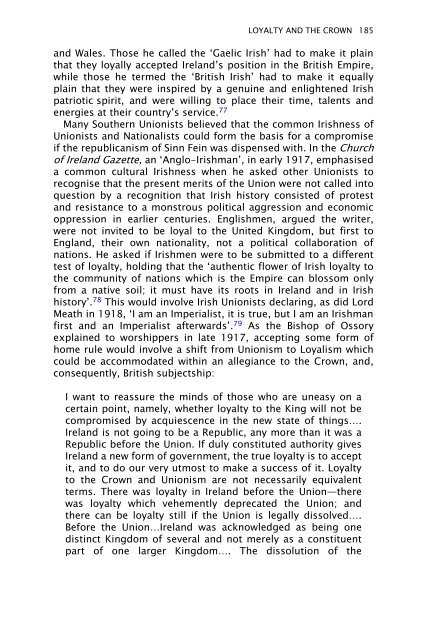Dividing Ireland: World War I and Partition
Dividing Ireland: World War I and Partition
Dividing Ireland: World War I and Partition
Create successful ePaper yourself
Turn your PDF publications into a flip-book with our unique Google optimized e-Paper software.
LOYALTY AND THE CROWN 185<br />
<strong>and</strong> Wales. Those he called the ‘Gaelic Irish’ had to make it plain<br />
that they loyally accepted <strong>Irel<strong>and</strong></strong>’s position in the British Empire,<br />
while those he termed the ‘British Irish’ had to make it equally<br />
plain that they were inspired by a genuine <strong>and</strong> enlightened Irish<br />
patriotic spirit, <strong>and</strong> were willing to place their time, talents <strong>and</strong><br />
energies at their country’s service. 77<br />
Many Southern Unionists believed that the common Irishness of<br />
Unionists <strong>and</strong> Nationalists could form the basis for a compromise<br />
if the republicanism of Sinn Fein was dispensed with. In the Church<br />
of <strong>Irel<strong>and</strong></strong> Gazette, an ‘Anglo-Irishman’, in early 1917, emphasised<br />
a common cultural Irishness when he asked other Unionists to<br />
recognise that the present merits of the Union were not called into<br />
question by a recognition that Irish history consisted of protest<br />
<strong>and</strong> resistance to a monstrous political aggression <strong>and</strong> economic<br />
oppression in earlier centuries. Englishmen, argued the writer,<br />
were not invited to be loyal to the United Kingdom, but first to<br />
Engl<strong>and</strong>, their own nationality, not a political collaboration of<br />
nations. He asked if Irishmen were to be submitted to a different<br />
test of loyalty, holding that the ‘authentic flower of Irish loyalty to<br />
the community of nations which is the Empire can blossom only<br />
from a native soil; it must have its roots in <strong>Irel<strong>and</strong></strong> <strong>and</strong> in Irish<br />
history’. 78 This would involve Irish Unionists declaring, as did Lord<br />
Meath in 1918, ‘I am an Imperialist, it is true, but I am an Irishman<br />
first <strong>and</strong> an Imperialist afterwards’. 79 As the Bishop of Ossory<br />
explained to worshippers in late 1917, accepting some form of<br />
home rule would involve a shift from Unionism to Loyalism which<br />
could be accommodated within an allegiance to the Crown, <strong>and</strong>,<br />
consequently, British subjectship:<br />
I want to reassure the minds of those who are uneasy on a<br />
certain point, namely, whether loyalty to the King will not be<br />
compromised by acquiescence in the new state of things….<br />
<strong>Irel<strong>and</strong></strong> is not going to be a Republic, any more than it was a<br />
Republic before the Union. If duly constituted authority gives<br />
<strong>Irel<strong>and</strong></strong> a new form of government, the true loyalty is to accept<br />
it, <strong>and</strong> to do our very utmost to make a success of it. Loyalty<br />
to the Crown <strong>and</strong> Unionism are not necessarily equivalent<br />
terms. There was loyalty in <strong>Irel<strong>and</strong></strong> before the Union—there<br />
was loyalty which vehemently deprecated the Union; <strong>and</strong><br />
there can be loyalty still if the Union is legally dissolved….<br />
Before the Union…<strong>Irel<strong>and</strong></strong> was acknowledged as being one<br />
distinct Kingdom of several <strong>and</strong> not merely as a constituent<br />
part of one larger Kingdom…. The dissolution of the








